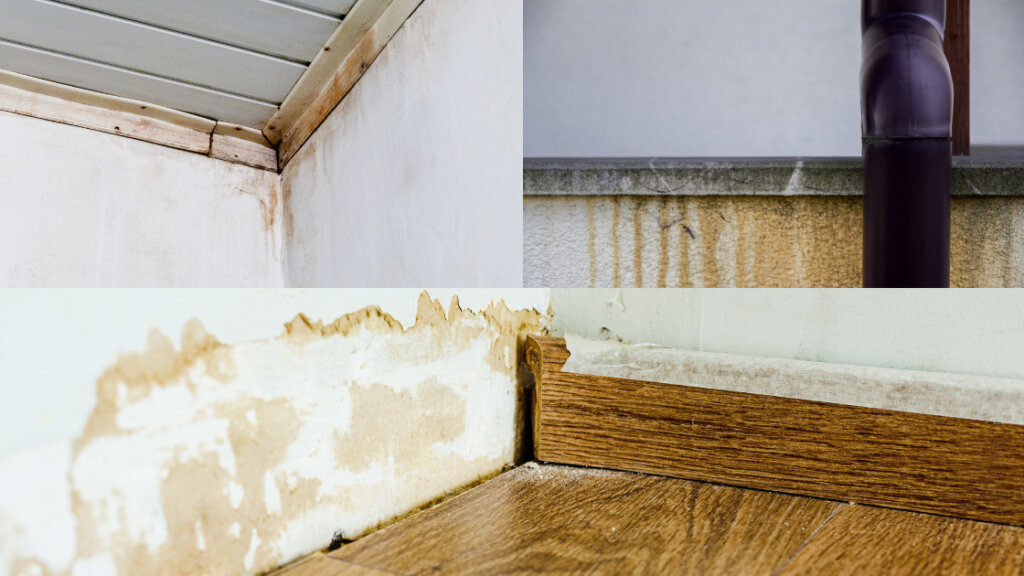

Water damage can occur in any home, but what happens when you want to sell your house? Many Fresno homeowners may ask themselves if they can sell a house with water damage. The answer is yes, but selling your home with water damage does come with some considerations and the need to repair the damage. In this article, we will cover everything you need to know about selling a water-damaged house. From recognizing water damage in your home to understanding the impact on property value, disclosing the damage while selling, and remedial actions for water-damaged homes; we’ve got you covered. We will also discuss insurance coverage for water damage, selling your home as-is vs making repairs, working with cash home buyers, and tips for selling a water-damaged house. Read on to learn more about how to navigate this challenging situation when selling your home.
Recognizing Water Damage in Your Home
Inspecting the plumbing system for leaks or damage is the traditional way to uncover potential water damage. Keep an eye out for mold, mildew, or musty odors, as they may indicate flood damage. Also, if you want to sell your house, check for water stains on ceilings or walls, and thoroughly investigate any flooring that appears warped – signs of potential damage. To sell your house in a good state, it’s vital to watch out for a sudden increase in water bills, which could be caused by leaks or floods, indicating water damage to your home.
Identifying Signs of Water Damage
When searching for signs of water damage to your home, pay close attention to any musty odor, as it’s often indicative of mold growth, a common result of water damage. Peeling paint can be a signal of water damage to your home concealed behind walls, while water stains on ceilings and walls are clear signs of possible water issues. Also, when preparing to sell your house, be wary of a sagging ceiling, as it could imply damage to your home originating on the roof. Discolored, warped, or buckling walls, floor, and trim should also be red flags for potential water damage to your home.
Common Causes of Water Damage: Leaks, Floods and More
Water damage to your home can result from various factors like leaks or flooding, and even poor ventilation. Leaks from plumbing or roofing, if not promptly repaired, can lead to extensive water damage to your home over time. Natural disasters such as floods and storms can lead to immediate and severe water damage to your home. Additionally, poor ventilation and high humidity levels can also contribute to water damage. Understanding these common causes is crucial for homeowners who want to sell their house without any water damage, to prevent potential issues, and address any damage promptly.
The Impact of Water Damage on Property Value

Water damage significantly reduces a home’s market value. Necessary repairs can lower the asking price, while potential future damage concerns discourage buyers. Severe water damage may lead to structural issues and pose health risks due to mold growth. Understanding these implications is crucial for homeowners looking to sell their property in an open market.
How Water Damage Affects Your Home’s Worth
Water damage can have a significant impact on the market value of a home. Potential buyers may be discouraged by the concerns related to water damage, affecting the home’s worth in the open market. Necessary repairs due to water damage can also influence the home’s asking price. Additionally, structural damage caused by water can further lower the property’s market value. It’s important to note the health risks associated with mold growth resulting from water damage.
Calculating the Cost of Repairs
When calculating the cost of repairs, it’s essential to assess the necessary repairs with a home inspector’s help. Understanding that mold remediation can be a costly process and realizing that structural damage repairs can be expensive is crucial. Additionally, considering potential plumbing system repairs due to water damage and keeping in mind that flooring, appliances, and gutters may need repairs are important factors to take into account.
Related Post: Selling a House With Water Damage or Flooding (How to Guide)
Disclosing: Selling a House with Water Damage
Understanding the necessity of full disclosure when selling a house with water damage is crucial. Legal obligations and potential consequences for failing to disclose such damage need to be realized. It’s important to disclose previous water damage and any potential for future damage to potential buyers. Additionally, guidance from a real estate attorney on the disclosure process is essential.
The Importance of Transparency
Full disclosure is crucial when selling a home with water damage. Transparency can build trust with potential buyers and fulfill legal obligations. It’s necessary to disclose previous water damage and understand the process with a real estate attorney’s guidance. By being open about any potential for future water damage, sellers can navigate the disclosure process in a traditional way while attracting house buyers and securing the best offer on the open market.
Legal Obligations and Potential Consequences
Understanding the legal obligations and potential consequences of nondisclosure is crucial when selling a house with water damage. Failing to disclose water damage can lead to disputes, claims, or litigation, impacting the entire house sale process. It’s essential to note the disclosure process with a real estate attorney’s guidance and ensure full transparency to avoid future water damage claims. Disclosing flood damage is a traditional way to build trust with house buyers and secure the best offer.
Remedial Actions for Water Damaged Homes
Understanding the restoration process for a home with water damage is crucial. Repairing any necessary structural damage is essential and may involve mold remediation as well. Don’t overlook the importance of plumbing system repairs due to water damage. Additionally, consider necessary repairs for appliances, flooring, and gutters to restore the entire house. This traditional way of remediation ensures that the house is well-prepared for the open market.
Professional Water Damage Restoration Services
Expert water damage restoration services can effectively mitigate potential health risks associated with mold and structural damage. These professionals offer a comprehensive assessment of the extent of water damage, ensuring that all areas are thoroughly addressed. By preventing future structural damage, restoration services play a crucial role in maintaining the value of the property. Additionally, restoration companies can expedite the process, ultimately leading to a successful sale of the property.
DIY Solutions for Minor Water Damage
When experiencing minor water damage, DIY solutions offer effective and cost-saving options for homeowners. These solutions may involve cleaning, drying, and disinfecting the affected areas to prevent mold growth. However, it is essential to assess DIY efforts for potential safety concerns. Acting quickly and implementing traditional methods can help mitigate future flood damage and save money on restoration costs. Homeowners should prioritize addressing minor water damage to prevent further issues.
Insurance Coverage for Water Damage
Understanding the nuances of insurance coverage is essential for facilitating necessary repairs and protecting against future water damage. Policies may vary depending on flood zone classification, making it crucial to have adequate coverage for a successful home sale. Additionally, policyholders should transparently disclose any previous water damage when selling, ensuring a smooth transaction in the open market.
Understanding Your Policy
Reviewing your insurance policies becomes essential to understand coverage details. Having a clear understanding of the policy can prevent potential issues with claims and provide insights into the claims process from insurers. It’s important to note that policies may cover damage caused by natural disasters, making it crucial for homeowners to familiarize themselves with the policy to aid in proper disclosure.
Making a Claim
Timely claims expedite necessary repairs and cover restoration costs. Filing a detailed claim is crucial for a successful settlement, and professional assistance can aid in navigating the process. Full disclosure to insurers facilitates a successful claim.

Selling Your Home As-Is vs Making Repairs
When selling your home, consider the traditional way of making repairs to enhance its market value. However, selling as-is can attract house buyers looking for flood-damaged properties without the hassle of repairs. Open market buyers might seek disclosures on the most common causes of water damage and FEMA claims. Making necessary repairs can optimize the asking price, while as-is sales save on invoices, receipts, and time.
Weighing the Pros and Cons
Selling a property “as-is” can streamline the selling process, appealing to home investors and cash house buyers. On the other hand, investing in repairs can attract traditional house buyers in the open market. However, selling “as-is” might require settling for a lower asking price, while necessary repairs can address concerns and fetch the best offer. Market conditions should be carefully considered to make an informed decision.
Market Conditions for As-Is Sales
Market conditions play a significant role in influencing as-is sales, being driven by market demand and supply. Real estate investors often express interest in acquiring as-is properties due to the potential for profitable returns. The success of as-is sales can be greatly impacted by prevailing market conditions. Additionally, as-is sales offer a swift exit from flood-damaged properties, making them an attractive option in certain market scenarios, especially if traditional buyers are overlooking such properties in a competitive market.
Working with Cash Home Buyers

When selling a house with water damage, working with cash home buyers can offer a quick sale process without the need for traditional showings. Cash offers may circumvent realtor fees and provide relief from water damage restoration costs. Cash buyers can simplify the home sale process by potentially overlooking previous water damage. This can be beneficial for homeowners looking to sell their property in an expedited manner.
The Benefits of Cash Offers
Cash offers present a way to bypass potential appraisal issues and expedite the home sale process. Buyers using cash may overlook the poor condition of the property, offering sellers relief from concerns about water damage. Additionally, cash offers can provide certainty in a fluctuating market, avoiding potential home inspection concerns. By considering cash offers, sellers can streamline the selling process and mitigate the impact of water damage on property value.
Selecting a Reputable Cash Home Buying Company
When choosing a reputable cash home buying company like Click Cash Home Buyers, research their reputation and reviews. Verify their valid business license and experience in handling water-damaged properties. Seek recommendations from previous clients and confirm their ability to handle necessary repairs. Ensure that the company is reliable and has a track record of successful transactions. By doing so, you can find a trustworthy buyer who will offer the best deal for your property.
Tips for Selling a Water-Damaged House
Understanding the concerns of potential buyers regarding water damage is crucial. Evaluating whether to make repairs or sell as-is can impact your selling process. Full disclosure about previous water damage and the restoration process builds trust. Consulting with a real estate attorney ensures legal compliance and transparency. Considering flood insurance addresses future water damage risks, providing peace of mind to house buyers.
Enhancing Curb Appeal Despite Damage
Despite flood damage, enhancing the curb appeal of your property can be approached in a traditional way. Investing in landscaping can divert attention from water damage, while strategic staging and emphasizing the property’s unique features can draw attention away from the issues. Repairing visible water damage, highlighting the potential of the entire house, and utilizing effective marketing strategies can attract potential house buyers and secure the best offer on the open market.
What If Your House Doesn’t Sell?
If your house doesn’t sell, consider hiring a real estate investor as an alternative selling option. Evaluate the market value of the house and adjust the asking price if necessary. Address safety concerns and health risks associated with water damage. Explore the option of selling to a traditional buyer with full disclosure. Collaborate with a real estate agent experienced in selling water-damaged homes.
Can a house with water damage be sold?
Yes, a house with water damage can be sold. However, it may require repairs and renovations to address the water damage and restore the property’s value. It is important to disclose any water damage to potential buyers and adjust the selling price accordingly.
Key Takeaways: Sell a House with Water Damage
1. Recognize the signs of water damage in your home, including mold, musty odors, water stains, and warped flooring.
2. Understand the common causes of water damage, such as leaks, floods, and poor ventilation.
3. Water damage significantly reduces a home’s market value, so it’s important to address and disclose the damage to potential buyers.
4. Calculate the cost of repairs, including structural damage, plumbing repairs, and appliance replacements.
5. Full disclosure of water damage is essential when selling your home to avoid legal obligations and potential consequences.
6. Consider professional water damage restoration services to mitigate health risks and maintain the value of the property.
7. Understand your insurance coverage for water damage and consider making a claim to cover restoration costs.
8. Decide whether to sell your home as-is or make repairs based on market conditions and buyer preferences.
9. Working with cash home buyers can offer a quick sale process without the need for traditional showings.
10. Enhance the curb appeal of your property despite water damage by investing in landscaping and staging effectively.
11. If your house doesn’t sell, consider alternatives like hiring a real estate investor or collaborating with a real estate agent experienced in selling water-damaged homes.
12. Selling a house with water damage is possible with proper preparation and navigating the selling process effectively.
The Bottom Line
Yes! Selling a house in Fresno with water damage can be a challenging task, but it’s not impossible. It’s important to recognize the signs of water damage and understand the impact it can have on your property’s value. Transparency is crucial when disclosing water damage while selling, as it helps build trust with potential buyers and avoids legal consequences. Depending on the extent of the damage, you can consider professional water damage restoration services or DIY solutions for minor issues. Understanding your insurance coverage and making a claim can also help offset the costs. Additionally, you can explore options like selling your home as-is or working with cash home buyers. By following these tips and considering market conditions, you can navigate the process of selling a water-damaged house effectively.

Contact Us
We would love to hear from you! Please fill out this form and we will get in touch with you shortly.

